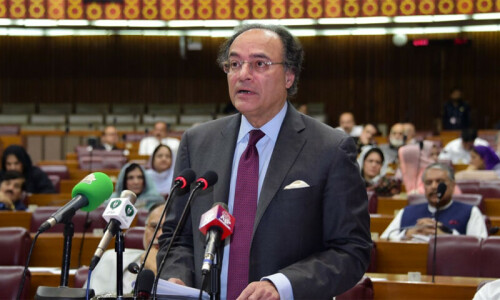KARACHI: While rejecting the federal budget 2024-25, almost all the key chambers and trade associations have asked the government to abolish the Final Tax Regime (FTR) and other anti-exports taxation measures.
They believe that these measures will have disastrous consequences, leading to a decline in precious foreign exchange earnings and adversely affecting revenue generation for the national exchequer and urban employment for millions of people.
Addressing a press conference at the PHMA House on Tuesday, which was virtually attended by representatives of various associations from other stations across the country, Chief Coordinator and Spokesman of All Exports Associations of Pakistan (AEAP) Muhammad Jawed Bilwani warned the government to observe a black day and suspend exports for one day if the issue isn’t resolved immediately.
“The next option is to close the factories,” he warned.
Exporters from all over Pakistan have unanimously rejected the proposed imposition of a Normal Tax Regime (NTR) and abolishing the FTR regime for exporters, terming it “counterproductive.”
This would create unnecessary hassle with the uncalled-for involvement of FBR officials and may open the gates of corruption. Other association representatives were also online from the upcountry during the press briefing.
Presently, the 1 per cent tax deduction under FTR is at source deducted electronically upon receipt of export proceeds, irrespective of profit or loss, without human intervention in a transparent manner.
The finance minister, the FBR chairman and the commerce minister have yet to consult the textile export associations for the federal budget proposals FY25.
Various chambers of commerce and industry representatives also lamented that the removal of zero-rating on local supplies to registered exporters will compel them to claim sales tax refunds from FBR, a lengthy process contrary to the spirit of EFS.
Tax on healthcare devices
In Islamabad, the Healthcare Devices Association of Pakistan (HDAP) has expressed concern on behalf of patients, healthcare providers and stakeholders over the government’s decision to impose sales tax on healthcare devices.
It said that the imposition of 25 to 30 per cent sales tax on essential healthcare products such as cardiac equipment, dialysis machinery and diagnostic kits, alongside the removal of tax exemptions for charitable hospitals (GST exemptions from the Sixth Schedule), threatens to increase healthcare costs massively.
However, an official of the Drug Regulatory Authority of Pakistan (Drap) said the exemption of tax should be only for genuine charitable and welfare hospitals and a clear policy should be made by the government to identify them.
“The imposition of this hefty sales tax on essential healthcare products is a devastating blow to our healthcare system. It threatens to make vital medical treatments unaffordable for millions of people of the country, particularly those from the low-income group,” HDAP chairman Masood Ahmed told Dawn on Tuesday.
Published in Dawn, June 26th, 2024















































Dear visitor, the comments section is undergoing an overhaul and will return soon.